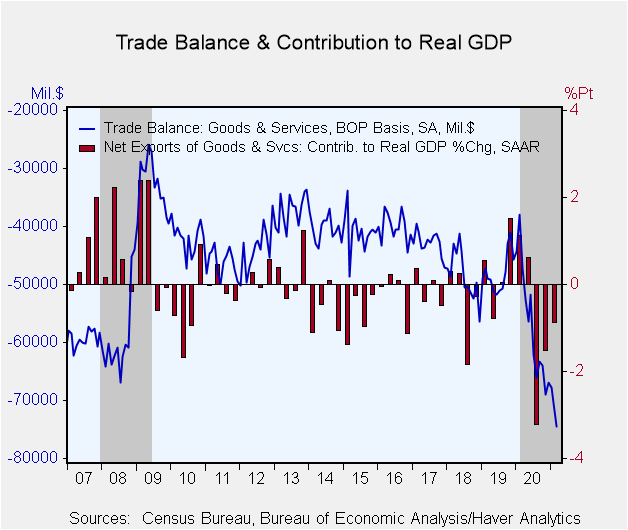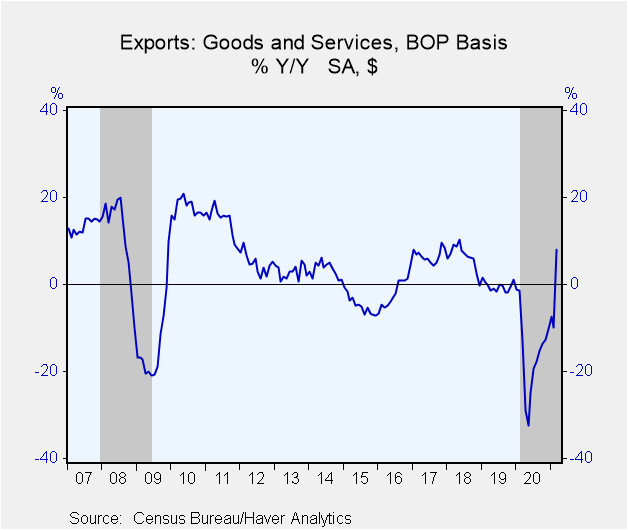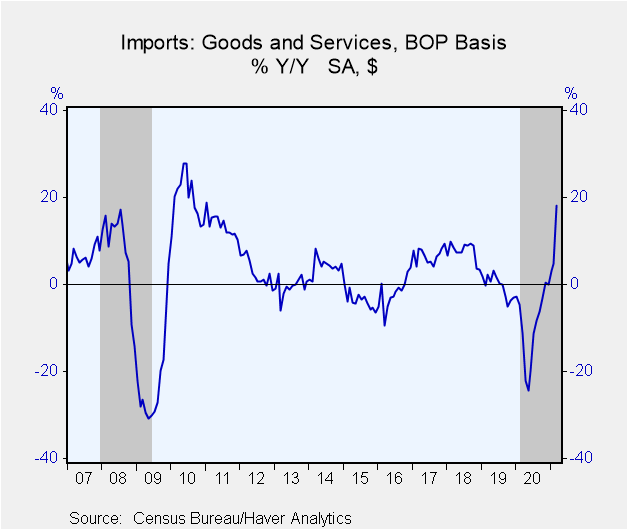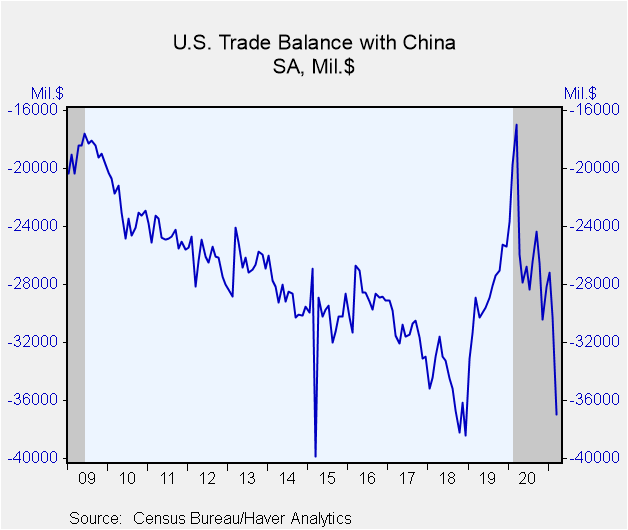 Global| May 04 2021
Global| May 04 2021U.S. Trade Deficit Deepens to Record in March
by:Tom Moeller
|in:Economy in Brief
Summary
• Exports & improve moderately. • Oil prices lift petroleum imports. The U.S. trade deficit in goods and services widened to $74.4 billion during March from February's $70.5 billion, revised from $71.1 billion. The deficit was a [...]
• Exports & improve moderately.
• Oil prices lift petroleum imports.
The U.S. trade deficit in goods and services widened to $74.4 billion during March from February's $70.5 billion, revised from $71.1 billion. The deficit was a record for this measure which dates back to January 1992. The Action Economics Forecast Survey anticipated a $74.5 billion deficit.
Exports increased 6.6% (8.1% y/y) following a 2.4% decline. Imports rose 6.3% (18.1% y/y).
The trade deficit in goods deepened to a record $91.6 billion in March from $87.9 billion in February. The advance trade data reported last month showed a goods deficit of $90.6 billion. Exports of goods increased 8.9% (11.9% y/y) as nonauto consumer goods exports strengthened 13.3% (16.0% y/y). Capital goods exports rose 7.5% (-1.0% y/y) while auto exports strengthened 7.2% (15.3% y/y). Imports of goods rose 7.0% (20.8% y/y). Auto imports improved 7.3% (8.4% y/y), after falling for two months while nonauto consumer goods imports rose 7.4% (38.0% y/y). Capital goods imports increased 5.6% (16.5% y/y).
Petroleum imports increased 15.4% in March (30.9% y/y) as prices rose. Crude oil prices averaged $62.63 per barrel versus $59.12 in February. In constant dollars, oil imports gained 7.2% (0.5% y/y). Nonoil imports rose 6.5% (20.1% y/y) and in constant dollars they increased 5.5% (15.5% y/y).
The March services trade surplus narrowed to $17.1 billion. It was the smallest surplus since January 2012, down from a peak surplus of $26.6 billion in March 2018. The value of services exports rose 1.4% (-0.6% y/y). Travel exports rose 9.6% (-26.7% y/y). Charges for the use of intellectual property eased 0.1% (+11.2% y/y). Imports of services rose 2.8% (4.8% y/y). Travel imports rose 6.4% (-19.1% y/y). Intellectual property imports edged 0.1% higher (-4.4% y/y).
The goods trade deficit with China deepened sharply in March to a seasonally adjusted $36.9 billion from $30.3 billion. Exports rose 8.6% (56.8% y/y) and imports rose 18.6% (99.4% y/y). The trade deficit with Japan deepened to $5.1 billion and the deficit with the European Union narrowed to $16.9 billion.
The international trade data, including relevant data on oil prices, can be found in Haver's USECON database. Detailed figures on international trade are available in the USINT database. The expectations figures are from the Action Economics Forecast Survey, which is carried in AS1REPNA.
| Foreign Trade in Goods & Services (Current $) | Mar | Feb | Jan | Mar '20 | 2020 | 2019 | 2018 |
|---|---|---|---|---|---|---|---|
| U.S. Trade Deficit ($ bil.) | 74.45 | 70.52 | 67.82 | 47.24 | 681.70 | 576.86 | 579.94 |
| Mar. Y/Y | |||||||
| Exports of Goods & Services (% Chg) | 6.6 | -2.4 | 1.1 | 8.1 | -15.9 | -0.4 | 6.4 |
| Imports of Goods & Services (% Chg) | 6.3 | -0.7 | 1.2 | 18.1 | -9.5 | -0.5 | 7.5 |
| Petroleum (% Chg) | 15.4 | 8.7 | 15.9 | 30.9 | -39.9 | -14.0 | 20.8 |
| Nonpetroleum Goods (% Chg) | 6.5 | -1.5 | 0.9 | 20.1 | -3.6 | -0.4 | 7.4 |
Tom Moeller
AuthorMore in Author Profile »Prior to joining Haver Analytics in 2000, Mr. Moeller worked as the Economist at Chancellor Capital Management from 1985 to 1999. There, he developed comprehensive economic forecasts and interpreted economic data for equity and fixed income portfolio managers. Also at Chancellor, Mr. Moeller worked as an equity analyst and was responsible for researching and rating companies in the economically sensitive automobile and housing industries for investment in Chancellor’s equity portfolio. Prior to joining Chancellor, Mr. Moeller was an Economist at Citibank from 1979 to 1984. He also analyzed pricing behavior in the metals industry for the Council on Wage and Price Stability in Washington, D.C. In 1999, Mr. Moeller received the award for most accurate forecast from the Forecasters' Club of New York. From 1990 to 1992 he was President of the New York Association for Business Economists. Mr. Moeller earned an M.B.A. in Finance from Fordham University, where he graduated in 1987. He holds a Bachelor of Arts in Economics from George Washington University.
More Economy in Brief
 Global| Feb 05 2026
Global| Feb 05 2026Charts of the Week: Balanced Policy, Resilient Data and AI Narratives
by:Andrew Cates










